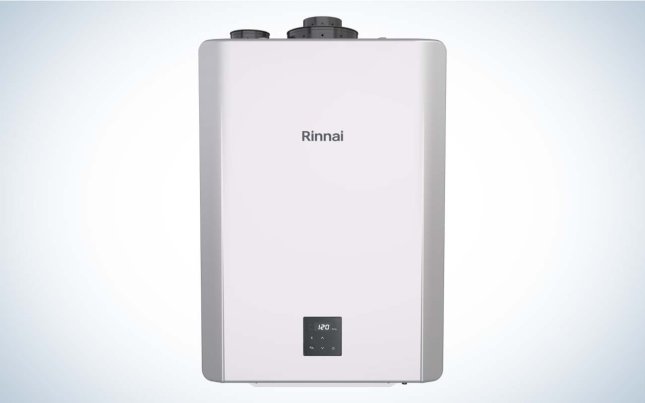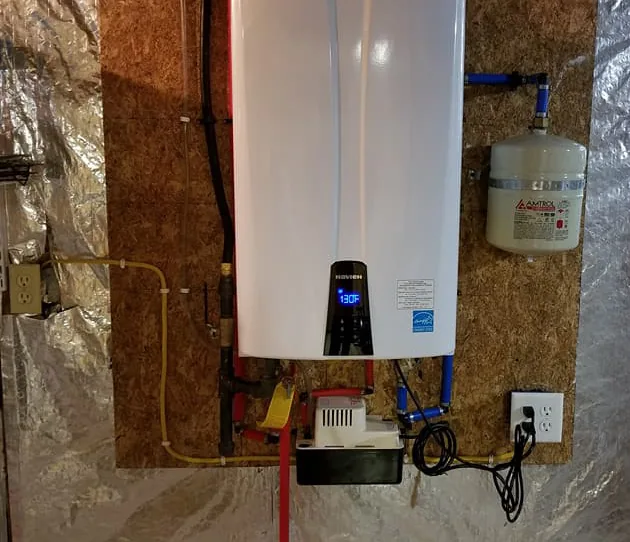What Tankless Water Heaters Deliver Important Benefits
What Tankless Water Heaters Deliver Important Benefits
Blog Article
Have you been in search of facts around Unveiling the Hot Trend: The Benefits of Tankless Water?

In a world where benefit and performance reign supreme, it's no surprise that home owners are continuously looking for smarter means to handle their home's power usage and comfort. One development that has actually continuously gotten popularity is the tankless water heater. Yet what exactly makes these systems stand out from the standard tank-based versions the majority of us matured with? Allow's dive in and check out the benefits of tankless hot water heater, assisting you determine if it's time to make the switch in your home.
Intro
Picture this: you enter the shower after a long day, expecting a soothing waterfall of hot water, just to be greeted by icy droplets because the last individual used all of it up. Sound acquainted? Conventional hot water heater store a set amount of warm water, suggesting you go to the mercy of that tank's supply. Tankless systems, on the other hand, warm water as needed. Say goodbye to going out mid-shower, say goodbye to fumbling with schedules just to make sure warm water is available.
Understanding Tankless Water Heaters
What Are Tankless Water Heaters?
Tankless water heaters, in some cases referred to as on-demand or immediate water heaters, offer hot water just as it's required. Rather than keeping gallons of pre-heated water, these units kick right into activity the moment you activate the tap. Water travels through a warm exchanger, warming up in real-time, meaning you get an uninterrupted circulation of hot water without the need for a large container resting idly by.
Just how Do They Vary from Standard Systems?
Traditional heating units hold a reservoir of hot water, making use of energy to keep that container at a consistent temperature level. Tankless units eliminate the standing supply, lowering wasted energy and the large impact of a large cylinder. Essentially, you're upgrading from a "stockpile" mindset to a "made-to-order" method.
Typical Kinds Of Tankless Units
Tankless hot water heater usually are available in two selections: gas and electrical. Gas designs have a tendency to provide greater flow prices, perfect for bigger families, while electric models often offer smaller sized homes and are usually simpler to install. In addition, some systems are developed for point-of-use (serving one fixture) while others can take care of the entire home's warm water needs.
Key Benefits of Tankless Hot Water Heater
1. Limitless Warm Water Supply
Ever had to set up showers so everyone obtains their reasonable share of warm water? With tankless, that becomes a thing of the past. As long as the heater's flow capability isn't surpassed, you can take back-to-back showers without turning into a popsicle.
2. Power Efficiency and Cost Savings
No more heating a titan storage tank's worth of water and keeping it cozy throughout the day. Tankless heating units minimize standby power losses, which can decrease utility expenses. While the preliminary expense may be higher, the lasting financial savings frequently justify the financial investment.
3. Space-Saving Style
If your home is short on storage, eliminating the bulky container maximizes valuable room. Tankless units are portable and can commonly be mounted on wall surfaces, hidden in corners, or mounted in tight energy closets without gobbling up the whole room.
4. Longer Lifespan
A properly maintained tankless hot water heater can outlast its tank-based cousin. Conventional tanks might last 10-15 years, while tankless designs can keep chugging along for 20 years or more, making them a strong investment over time.
5. Improved Water Top Quality
Saving water in a tank can occasionally cause debris buildup or a somewhat "off" taste. With tankless systems, fresh water is warmed right away, decreasing the possibilities of debris buildup and potentially providing cleaner-tasting water.
Factors to consider Before Switching
Though the advantages are compelling, it's smart to think about a few variables prior to totally devoting.
Initial Investment Prices
Tankless heating units normally include a higher upfront price. Between the unit itself and prospective installation adjustments, the preliminary expense might offer you sticker shock. But remember to watch it as a lasting investment.
Installation Needs
Relying on your home's framework, you may need additional electric capability or gas line upgrades. Ensure you recognize the setup requirements and consult with a specialist to avoid shocks.
Assessing Your Home's Water Usage Patterns
If your family all at once makes use of numerous components with high hot water demand, make sure the system's circulation rate meets your requirements. Knowing your usage patterns helps you pick the right size and type of tankless heater.
Maintenance and Treatment Tips
Tankless systems are relatively low maintenance, however they aren't set-it-and-forget-it home appliances.
Routine Cleaning and Descaling
Difficult water minerals can develop in the heat exchanger, affecting performance. Normal descaling (often recommended annually) keeps the unit running at peak performance.
Annual Professional Assessments
A yearly checkup from an expert makes sure small issues are caught early. They'll assess the device's efficiency, search for leaks, and aid preserve optimal efficiency.
Ensuring Correct Ventilation
For gas models, correct air flow is necessary to safely expel exhaust gases. See to it venting systems are tidy and properly installed to prevent any kind of prospective safety dangers.
Contrasting Different Brands and Models
Not all tankless water heaters are produced equal.
Researching Dependable Producers
Search for reliable brands with a history of producing quality systems. A dependable producer commonly supplies much better client assistance and longer service warranties.
Checking Out Testimonials and Individual Comments
Individual reviews and comments from neighbors or close friends that have gone tankless can offer important insights. Sometimes, real-life experiences can be much more informing than advertising sales brochures.
Installment: DIY or Expert?
While some house owners relish tackling projects themselves, tankless installation may not be the very best time to burst out the toolbox.
Advantages and disadvantages of DIY Installation
A DIY mount could save money, yet it features dangers. Inaccurate installation can bring about inadequacy or safety and security worries. If you come in handy and have experience, it may be viable-- however wage care.
When to Call a Professional Plumbing Technician
For a lot of, calling a pro ensures whatever's done correctly. A specialist plumber recognizes local codes, sizing demands, and airing vent parameters, decreasing the threat of mishaps.
Maximizing Efficiency
You've purchased a tankless unit-- now optimize its effectiveness.
Ideal Temperature Setups
The majority of people set their units between 120-140 F. Changing the temperature can enhance comfort and savings. Experiment to find a sweet place that does not lose power.
Coupling With Low-Flow Fixtures
Wish to stretch your device's capacities? Consider installing low-flow showerheads and faucets. They decrease water usage, enabling your tankless system to deliver a consistent stream of warm water without straining.
Environmental Impact
Tankless hot water heater straighten with greener living goals.
Reduced Carbon Impact
By using much less power and only heating water as needed, tankless systems can reduce your home's carbon footprint, reducing your environmental influence.
Conserving Natural Resources
Less power usage and much less wasted hot water translate right into less natural deposits being utilized, an environmental win-win.
Who Benefits The Majority Of from Tankless Heating units?
The charm of tankless heating systems is that they can match a variety of houses.
Big Families vs. Solitary Residents
Huge families may like the unlimited warm water supply, while single residents appreciate the power cost savings from not heating an entire container for just a single person's morning shower.
Home Owners with Limited Space
If your home is short on square video footage, losing the large storage tank liberates room for other fundamentals-- or possibly simply extra breathing space.
Eco-Conscious Customers
Going tankless aligns with eco-friendly values, guaranteeing you're not squandering power or resources.
Future Patterns in Tankless Hot Water Heater
The world of home appliances is ever-evolving, and tankless hot water heater are no exemption.
Smart Home Combination
Imagine readjusting your hot water heater's temperature via an app or getting maintenance alerts on your phone. As wise home technology developments, we'll see more connection and convenience.
Improvements in Modern technology
R&D is constantly improving warmth exchangers, making systems much more effective and sturdy. Future models could be also quieter, a lot more compact, and far better fit for differing climates.
Conclusion
Choosing a tankless water heater is greater than simply upgrading your home's warm water system; it's investing in long-term convenience, energy performance, and a greener lifestyle. By considering your family's water usage, bearing in mind installment needs, and dedicating to regular upkeep, you can delight in a constant stream of hot water without the baggage of a cumbersome tank. As technology progresses, you can eagerly anticipate also smarter, extra effective tankless services that not only make your life simpler however also benefit the world.
Why You Should Consider a Tankless Water Heater for Your Home
Energy Efficiency and Cost Savings
Tankless water heaters, also known as on-demand water heaters, heat water only when needed. This means they don't waste energy keeping a tank of water hot constantly. This efficiency translates into substantial cost savings on your monthly energy bills.
Endless Hot Water Supply
One of the significant advantages of tankless water heaters is their ability to provide a continuous supply of hot water. Traditional tank water heaters have a limited capacity and can run out of hot water, especially during peak usage times. In contrast, tankless water heaters can provide an endless stream of hot water, making them ideal for larger families or homes with high water usage.
Space-Saving Design
Tankless water heaters are compact and take up significantly less space compared to traditional tank heaters. They can be installed on walls, under cabinets, or even outside, freeing up valuable space in your home. This makes tankless water heaters a great option for smaller homes or properties with limited space for a traditional water heater.
Longer Lifespan and Lower Maintenance
Tankless water heaters typically have a longer lifespan compared to traditional tank heaters. They can last up to 20 years or more with proper maintenance. Additionally, tankless systems are designed with replaceable parts, which can extend their lifespan further and reduce long-term maintenance costs.
Environmentally Friendly
Reducing energy consumption not only saves you money but also benefits the environment. Tankless water heaters contribute to a smaller carbon footprint by using less energy to heat water. Their energy efficiency and ability to minimize standby heat loss make them an eco-friendly choice for environmentally conscious homeowners.
Customized Temperature Control
Tankless water heaters offer precise temperature control, allowing you to set the desired temperature to meet your specific needs. This level of customization ensures you always have water at the perfect temperature for your comfort and usage requirements.
https://beantownservices.com/blog/consider-tankless-water-heater-for-your-home

Do you appreciate reading up on Why You Should Consider a Tankless Water Heater? Try to leave feedback down the page. We'd be glad to find out your insights about this blog entry. We hope that you come back again in the future. Liked our post? Please share it. Let someone else find it. Thank you for your time. Revisit us soon.
Click Here Report this page